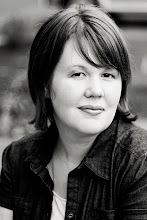Our family had a blessing in disguise as we didn't get to do baptisms at the Seoul temple because of a slight lack of planning on our part. This allowed us, on a pretty limited schedule, to spend almost two hours in the family history library. We weren't able to miraculously fill out Chris' family tree or anything but we did learn some very important things. (This list is for future reference. Please bear with me.)
1. I learned how to simultaneously enter Hangul, romanization AND Hanja for names. Why would I want to? Hangul helps you pronounce it correctly and is what is used in Korea. Important stuff. Romanization allows Americans to pronounce it. Hanja is the ancient Chinese character that the Hangul is based on. It allows you to pinpoint the origin of a name and differentiate between what looks like 5 of the same names. (They can all be based on different characters)
2. I learned that I need to go back and do this for everyone currently in our tree. It helps avoid duplication. I'm pretty sure Chris is feeling inspired and ready to go through all of those names before I get back. Right, honey??
3. I learned that we can order a government document that basically include 4 generations. Chris had one for his dad but I didn't realize we could order them on a whim! I need to plot with Uncle to get ones ordered for the different lines. Mwahaha...
4. The Park Miryang clan is crazy huge which makes it hard to research. Think Smith and Jones. Obscure last names are a blessing in Korean genealogy, too. The Kang line is a blessing as we're from a small Kang clan.
5. Korean indexing is on the horizon. I didn't get a timeline but it sounds like it's soon. I've been hoping for this for at least 5 years!
6. I saved the best for last. Sometimes, the birth and death dates in jokbo listings include a King's name. This is huge. Jokbos are great. I love them. BUT they randomly switch back and forth between two different date systems. One is based on Chinese numbers, which I know and are easy to read. 1-9-9-5 is 1995. The other one is based on the lunar calendar and is on a 60 year rotation. If the year is _____, it could mean 1802,1862, 1922, etc. You have to reference different generations to guesstimate which year they're actually referring to. It's not too big of deal unless you're thinking....ok, this guy either had a kid at 14 or 74. OR, as in the case of our Kang jokbo, if the whole darn stinking book only uses the lunar calendar with no Chinese numbers in the whole darn book to reference. This is where the Kings that are referenced help. We got a chart today that includes the different kings of China, Korea and Japan to help you narrow down the birthdate. I'm excited to look at our jokbos and A. Use it in the Kang jokbo to find out what years I'm even dealing with and B. Go through our Lee jokbo and use the listed kings to verify dates.
Not family history related, we took a lovely ride along the Han River today after borrowing some bikes from a lovely rental joint that doesn't charge you. I don't understand how they manage but, nonetheless, We had a wonderful ride. I think it may have been my favorite activity so far on our trip. It was a little idyllic. The wind blowing in my hair (no helmets were provided!), Lilly humming a song in front of me (before she fell), the Seoul cityscape off in the distance, bells dinging, no throngs of people everywhere...it was the best!
Dirty Work is Afoot
7 years ago








No comments:
Post a Comment